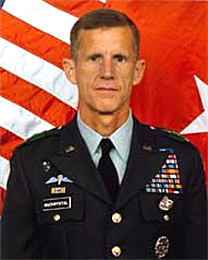US officials say that the inability of General Stanley McChrystal to move forward with his “Local Defense Initiative” (LDI) in Afghanistan is directly related to Ambassador Karl Eikenberry’s opposition to the program.

The LDI, in short, is a plan for the US to fund and in some cases arm tribal militias in the hopes that those groups will be able to fight the nation’s ever growing insurgency. Gen. McChrystal has hoped the plan could make up for struggling NATO efforts to increase the size of the Afghan military and police forces.
But Eikenberry expressed concern that the program was unwise until they had managed to transform the Afghan central government into a credible ruling force, as increasing the power of locals could further threaten Karzai’s tenuous reign. He also reportedly said that shoddy intelligence could mean the US was funding groups whom it was fundamentally at odds with.
Making matters worse, officials have expressed concern that the LDI could further strengthen tribal warlords, who would presumably be leading most of these forces. Afghan society is rife with corruption, and warlords are seen as no small part of that phenomenon.
Though Gen. McChrystal is under pressure to produce quick results to sell the continuation of the war to the American public, the consensus, at least among civilian administrators, is that the LDI may create even more problems than it is supposed to solve.


